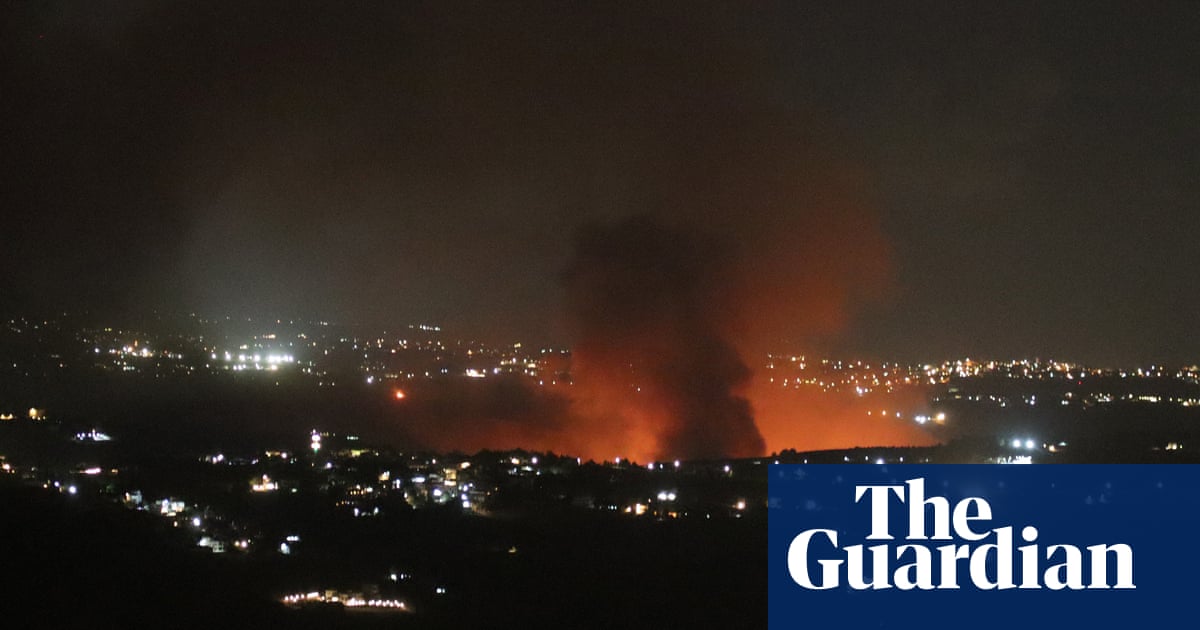Israel hits targets in Lebanon as Hezbollah launches deepest rocket attacks since Gaza war began | Lebanon

The Israeli military says it has launched airstrikes on hundreds of targets in southern Lebanon, as Hezbollah launched its deepest rocket attacks on Israel since the start of the Gaza war, fueling fears of a wider conflict.
The Israel Defense Forces (IDF) announced Saturday night that it had launched two waves of attacks – one targeting around 290 targets and a second targeting 110 sites – in southern Lebanon, as sirens warning of Hezbollah rocket attacks sounded in dozens of towns in northern Israel.
About a dozen rockets were reportedly fired from Lebanon, most of which were intercepted, the Israeli military said. Israeli emergency medical services reported that one man was lightly injured by shrapnel from an intercepted missile in a village in the Lower Galilee.
Hezbollah announced on its Telegram channel early Sunday morning that it had targeted the Israeli airbase in Ramat David, near Haifa, with dozens of missiles in response to what it described as “repeated Israeli attacks on Lebanon.”
The airbase is the furthest target the Lebanese group has struck inside Israel since fighting began in October, about 50 km from the Lebanese-Israeli border.
Israeli Defense Minister Yoav Gallant delivered a speech at the Ramat David air base on Wednesday, telling the air force that Israel’s war against Hezbollah had reached a “new phase.” He also praised the “excellent results” of the Mossad, the military intelligence agency, in the region, just hours after a wave of attacks in Lebanon that hit walkie-talkies commonly used by Hezbollah operatives. Wednesday’s attack, which came on top of a previous operation targeting pagers, killed 42 people and wounded more than 3,000. Israel is believed to be behind the operation, although it has not officially claimed responsibility.
In July, Hezbollah released drone footage over the city of Haifa, highlighting the Ramat David airbase, as part of a nearly 10-minute video marking the military infrastructure of the densely populated northern Israeli city.
On Saturday, Israel closed its northern airspace pending Hezbollah retaliation for the killing of Ibrahim Aqil, a veteran commander of the elite Radwan unit, and more than a dozen other militants.
Three children and seven women were among the 37 people killed in Friday’s Israeli strike in Beirut that targeted the Hezbollah leader in a densely populated neighborhood, Lebanese authorities said.
U.S. and U.N. officials have warned of further escalation, with airlines including Air France, Turkish Airlines and Aegean canceling flights to Beirut, reflecting fears that a tumultuous week has pushed the region closer to all-out war.
Israel has not apparently slowed down its war in Gaza to focus on the north. On Saturday, its forces bombed a school converted into a shelter, killing at least 22 people and wounding 30 others, mostly women and children, the Gaza health ministry said. The Israeli military said the target was a Hamas base inside the school, without providing details or evidence.
Last week, however, Israel announced that it was expanding its strategic goals for the Gaza war to include the return to their homes of 60,000 residents evacuated from northern Israel, which has been regularly targeted by Hezbollah. It then launched an unprecedented series of attacks against the group.
The U.S. State Department on Saturday urged Americans in Lebanon to leave the country. “Due to the unpredictable nature of the ongoing conflict between Hezbollah and Israel and the recent explosions throughout Lebanon, including in Beirut, the U.S. Embassy urges U.S. citizens to depart Lebanon while commercial options remain available,” it said in an updated advisory. “Currently, commercial flights are available, but at reduced capacity. If the security situation worsens, commercial departure options may become unavailable,” it added.
In late July, the United States raised its travel advisory for Lebanon to its highest level, “do not travel,” after a strike in southern Beirut killed a Hezbollah commander.
Hezbollah began launching attacks in support of its ally Hamas after October 7 and indicated that it would stop targeting Israel when the offensive in the Gaza Strip ended, unless Israel continued bombing Lebanon.
Months of missile, rocket and drone strikes have killed at least 23 soldiers and 26 civilians, turning Israel’s border regions near Lebanon into a strategic buffer zone, too dangerous for ordinary life.
In Lebanon, more than 500 people have been killed by Israeli strikes, mostly fighters from Hezbollah and other armed groups, but also more than 100 civilians.
Israel has not apparently slowed down its war in Gaza to focus on the north. On Saturday, its forces bombed a school converted into a shelter, killing at least 22 people and wounding 30 others, mostly women and children, the Gaza health ministry said. The Israeli military said the target was a Hamas base inside the school, without providing details or evidence.
With Agence France-Presse and Associated Press


